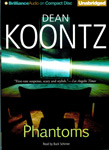
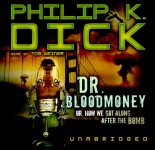 Dr. Bloodmoney, or How We Got Along After the Bomb
Dr. Bloodmoney, or How We Got Along After the Bomb
By Philip K. Dick; Read by Tom Weiner
7 CD – 8.5 Hours [UNABRIDGED]
Publisher: Blackstone Audio
Published: 2008
ISBN: 9781433245503
Themes: / Science Fiction / Telepathy / Post Apocalypse / Nuclear War / Satellites / Psychokinesis / California /
Philip Dick’s post-nuclear-holocaust masterpiece presents a mesmerizing vision of a world transformed, where technology has reverted back to the nineteenth century, animals have developed speech and language, and humans must deal with both physical mutations and the psychological repercussions of the disaster they have caused. The book is filled with a host of Dick’s most memorable characters: Hoppy Harrington, a deformed mutant with telekinetic powers; Walt Dangerfield, a selfless disc jockey stranded in a satellite circling the globe; Dr. Bluthgeld, the megalomaniac physicist largely responsible for the decimated state of the world; and Stuart McConchie and Bonnie Keller, two unremarkable people bent the survival of goodness in a world devastated by evil. Epic and alluring, Dr. Bloodmoney brilliantly depicts Dick’s undying hope in humanity.
The subtitle, of Dr. Bloodmoney is or How We Got Along After the Bomb, the idea for it came from the original publisher (ACE Books) who wanted to capitalize on the subtitle of the movie Dr. Strangelove. I can almost see it too. For me, this wasn’t Philip K. dick’s best novel. But, if you liked his best novel, you’ll like this one. I did. The thing is, no matter which one of Dick’s novels is your favourite, Doctor Bloodmoney will remind you of it – if only for the author’s voice. Dick, more than with any other emotion, writes with sympathy. You feel for his characters, their petty goals, their yearnings, their little prejudices. The plot on this one is almost unimportant, it’s also hard to sum up in a sentence, but I’ll try: A radio repairman with no limbs (due to phocomelia) has superpowers, which he uses to predict/cause WWIII, then becomes ultra-powerful as a big fish in a small pond.
The rule about writing what you know is more difficult in Science Fiction. Nobody’s been to Mars yet. Nobody has met an alien. But you can clearly see what Dick knows showing up on the pages of his SF novels. When he wrote Dr. Bloodmoney he was really into Jungian and Freudian analysis, he was reading Of Human Bondage and was probably an avid mushroom picker. The plot doesn’t really matter as this is a situation with a set of Dickian characters. What stands out, what will remain in my memory are the scenes, characters interacting with each other and themselves. Thinking their thoughts, acting their acts. When we meet the title character, Bruno Bluthgeld, for the second time later in the book, (he’s not the star), he’s showing off his talking sheep dog to a little girl. She asks to hear the dog speak. It does, and the tears came to my eyes. When Stuart McConchie goes into San Fransisco he parks his horse only to come back and find it eaten by the city’s underclass. It really is all there: The salesmen, the repairmen, the cheating wives, the murderous children and the sympathetic animals. Everything we expect from a Dick tale.
Blackstone Audio narrator Tom Weiner is fast becoming a new favourite. His natural timbre is basso but he can do a lot with it. Performance is the key, everybody gets a voice of their own. In this novel that’s especially necessary as there are more than a dozen characters sharing the plot and dialogue. Blackstone has more Dick headed to audiobook too. The Man In The High Castle has already been released. Ubik is winging it’s way to us right now and Flow My Tears, The Policeman Said, Valis, The Three Stigmata of Palmer Eldritch should be released over the next few months. We are living in very Dickian times my friends.
Posted by Jesse Willis

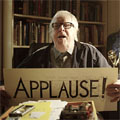 The New York Times website has a June 20th, 2009 audio clip |MP3| (just 3 minutes) of Ray Bradbury riffing on public libraries and the internet (love of libraries + hate of internet). This interview was in aide of his recent appearance at the cash strapped H.P. Wright Public Library in Ventura, California.
The New York Times website has a June 20th, 2009 audio clip |MP3| (just 3 minutes) of Ray Bradbury riffing on public libraries and the internet (love of libraries + hate of internet). This interview was in aide of his recent appearance at the cash strapped H.P. Wright Public Library in Ventura, California. 
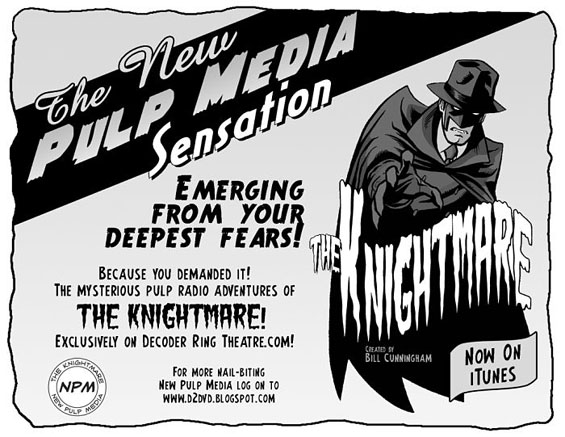
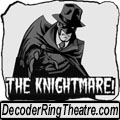 The Knightmare (The Murder Legion Strikes at Midnight)
The Knightmare (The Murder Legion Strikes at Midnight)

